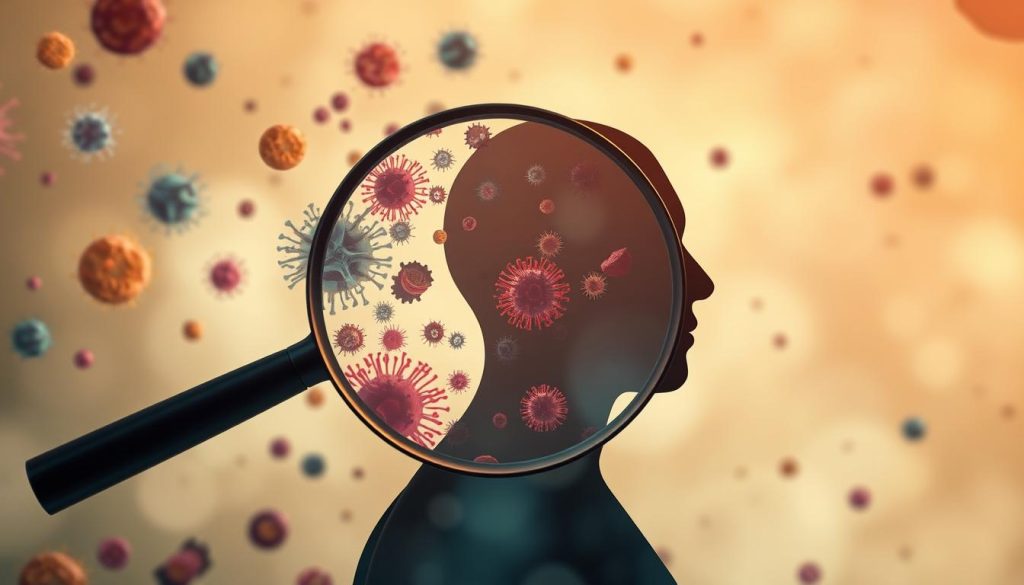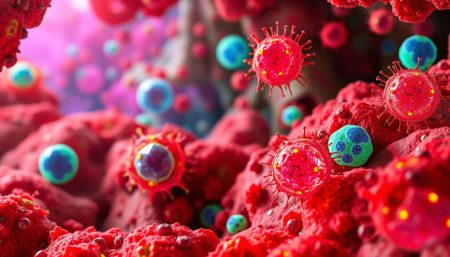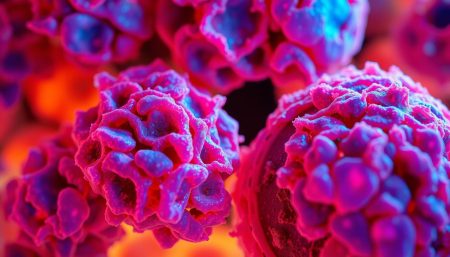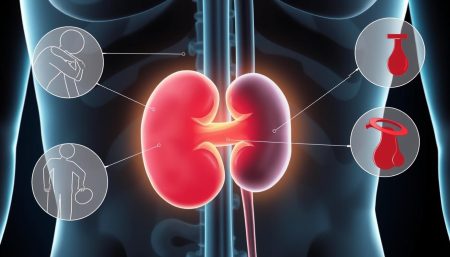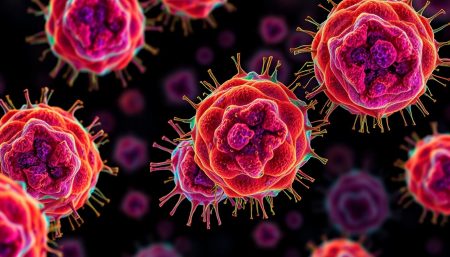Cancer is a tough opponent, but finding it early can make a big difference. Knowing the signs of cancer is key for quick action and better treatment. While signs can vary, being aware helps you take control of your health. Changes like unexplained weight loss or constant tiredness are important to notice. Paying attention to your body and knowing cancer signs can be life-changing. Let’s look at the main signs that might need a doctor’s check-up.
These signs don’t always mean you have cancer, but it’s smart to check them out. Early detection is a powerful tool in fighting cancer. By learning to recognize warning signs, you’re helping protect your health.
Understanding Cancer Detection and Its Importance
Finding cancer early is key in the fight against this disease. Spotting cancer signs early can greatly improve treatment results. Let’s dive into why early detection is so important and how it affects survival rates.
Why Early Detection Matters
Early cancer detection opens up better treatment options. Cancer is simpler to treat when caught early. This can lead to better health outcomes and a better life for patients.
Survival Rates and Early Diagnosis
The connection between early diagnosis and survival is clear. People diagnosed early have a better chance of successful treatment. Here are some survival rates for common cancers when caught early:
| Cancer Type | 5-Year Survival Rate (Early Stage) | 5-Year Survival Rate (Late Stage) |
|---|---|---|
| Breast Cancer | 99% | 27% |
| Colorectal Cancer | 90% | 14% |
| Lung Cancer | 56% | 5% |
The Role of Regular Health Screenings
Regular health screenings are essential for catching cancer early. These tests can spot cancer symptoms before they show up. Some key screenings include:
- Mammograms for breast cancer
- Colonoscopies for colorectal cancer
- Pap smears for cervical cancer
- Skin checks for melanoma
By being proactive and getting regular check-ups, you boost your chances of finding cancer early. Remember, catching cancer early can save lives.
Signs of Cancer: Common Warning Signals
It’s vital to know the signs of different cancers for early treatment. These signs don’t always mean cancer, but they need a doctor’s check. Spotting cancer early can greatly improve your chances of recovery.
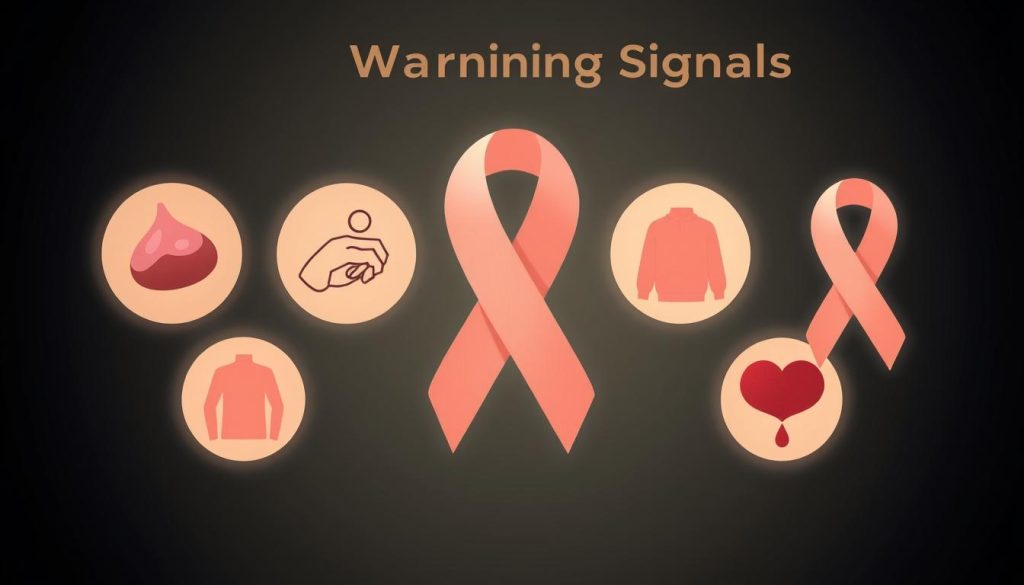
Cancer can show up in many ways, affecting different parts of the body. Some signs are easy to miss, while others are more obvious. Always watch for any changes that don’t go away.
| Body System | Common Warning Signals | Associated Cancer Types |
|---|---|---|
| Skin | Unusual moles, sores that don’t heal | Skin cancer, melanoma |
| Digestive | Unexplained weight loss, changes in bowel habits | Colorectal, stomach cancer |
| Respiratory | Persistent cough, shortness of breath | Lung cancer |
| Urinary | Blood in urine, frequent urination | Bladder, prostate cancer |
| Reproductive | Unusual bleeding, lumps in breast or testicles | Breast, testicular cancer |
Seeing these symptoms doesn’t mean you have cancer. Many other health issues can cause similar signs. The most important thing is to see a doctor if you notice any lasting changes in your health.
Unexplained Weight Loss and Appetite Changes
Unexplained weight loss is a key sign of cancer that should not be ignored. It often happens with changes in appetite. These are signs that need attention.
When Weight Loss Becomes Concerning
Losing weight without trying might seem good, but it’s a warning sign. If you lose 5% or more of your body in 6-12 months, it’s time to act. This could mean health issues, including cancer.
Changes in Eating Habits
Cancer can change how you feel about food. You might not want to eat foods you used to love. Or, you might feel full after eating a little.
Some people get thirsty more often or don’t like certain foods. These changes can lead to unexplained weight loss.
Related Digestive Symptoms
Weight loss often comes with digestive problems. You might feel sick, vomit, or have trouble swallowing. Stomach pain, bloating, or changes in bowel habits can also happen.
If you’re losing weight without trying and have these symptoms, see a doctor. It’s very important.
| Warning Signs | Potential Cancer Types |
|---|---|
| Unexplained weight loss | Pancreatic, Lung, Stomach |
| Loss of appetite | Ovarian, Colorectal, Liver |
| Difficulty swallowing | Throat, Esophageal |
| Persistent nausea | Brain, Stomach, Pancreatic |
Persistent Fatigue and Weakness
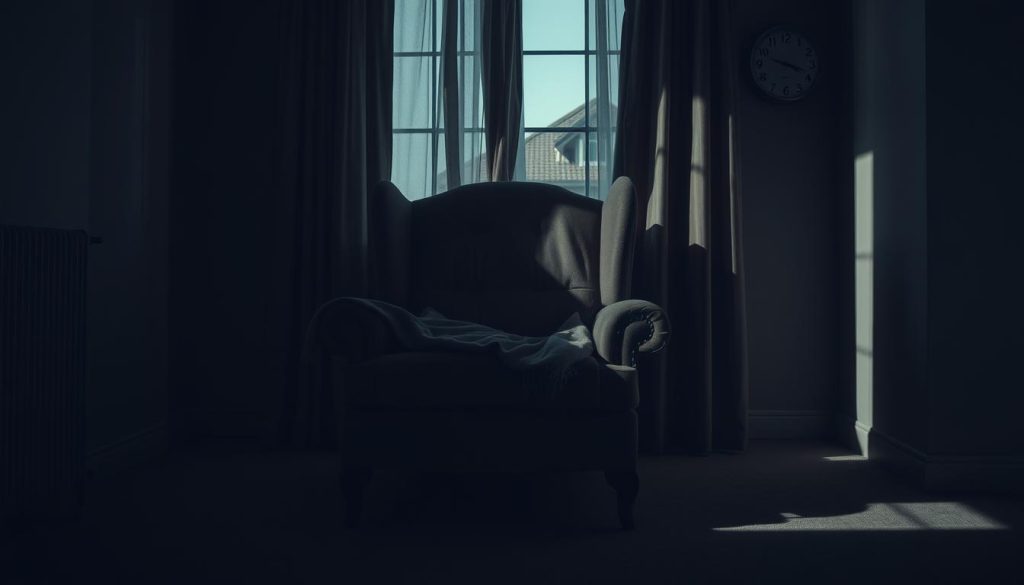
Feeling tired after a long day is normal. But, if you’re always tired and can’t shake it off, it might be a sign of cancer. This kind of exhaustion is different from just being tired and could mean your body is fighting something serious.
When looking for cancer signs, watch for fatigue that:
- Lasts for weeks
- Interferes with daily activities
- Doesn’t get better with sleep
Different cancers can make you feel tired in different ways. For instance, leukemia can make you very weak. On the other hand, colon cancer might make you feel tired slowly. Spotting these changes in your energy can help find cancer early.
If you’re always tired and can’t explain why, see your doctor. They can figure out what’s causing it and check for serious conditions. Remember, being tired all the time doesn’t always mean you have cancer. But, it’s a sign to watch for your health.
Unusual Bleeding or Bruising
Unexpected bleeding or bruising can be signs of cancer. Tumors can affect blood vessels or platelet production. Spotting these symptoms early can help with diagnosis and treatment.
Types of Abnormal Bleeding
Cancer symptoms include different kinds of bleeding:
- Blood in urine or stool
- Nosebleeds that happen often
- Coughing up blood
- Unexplained vaginal bleeding
- Bloody discharge from nipples
When to Seek Medical Attention
If you have persistent or severe bleeding, see a doctor right away. This is key if you also feel tired, lose weight, or have pain. Catching cancer early can greatly improve treatment outcomes.
Associated Skin Changes
Unusual bruising or bleeding can also show skin changes. Look out for:
- Excessive bruising in unusual places
- Petechiae (tiny red spots under the skin)
- Pale skin or yellowing of the skin and eyes
These signs might point to blood disorders or cancer. While they can be scary, they don’t always mean cancer. Yet, they need quick medical check-ups to rule out serious issues and get the right care.
Changes in Skin Appearance and Texture
Skin changes can be key signs of cancer. Unusual changes in your skin’s look or feel might mean health issues. Knowing these changes is important for early cancer detection.

Look for new moles or growths on your skin. Also, watch moles that change in size, shape, or color. These could be early signs of skin cancer. Rough, scaly patches or sores that don’t heal are also important to note.
Regular skin checks can help find problems early. Use a mirror to check hard-to-see areas. Look for:
- Asymmetrical moles
- Irregular borders on skin marks
- Unusual colors or color changes
- Moles larger than a pencil eraser
- Evolving spots that change over time
Not all skin changes mean cancer, but it’s smart to see a doctor if you notice anything odd. Early detection can greatly improve treatment outcomes.
| Skin Change | Possible Indication | Action |
|---|---|---|
| New mole or growth | Potential skin cancer | Monitor and consult doctor |
| Changes in existing mole | Melanoma risk | Seek immediate evaluation |
| Rough, scaly patches | Possible precancerous lesions | Professional skin exam |
| Persistent sores | Skin cancer risk | Medical assessment needed |
Persistent Pain and Discomfort
Persistent pain is a common sign that shouldn’t be ignored. While not all long-lasting pain means cancer, it’s important to listen to your body.
Location-Specific Pain Signals
Different cancers can cause pain in specific areas. For example, bone pain might indicate bone cancer. Abdominal pain could be a sign of colon or pancreatic cancer. Headaches that worsen over time might point to brain tumors.
Duration and Intensity Patterns
Cancer-related pain often persists and increases over time. It may start mild but gradually become more intense or frequent. If you experience pain that lasts more than a few weeks without clear cause, it’s wise to consult a doctor.
Pain Associated with Specific Cancers
Certain types of pain are linked to specific cancers:
- Back pain: Could indicate colon, ovarian, or pancreatic cancer
- Pelvic pain: Might be a sign of ovarian or uterine cancer
- Chest pain: Possibly related to lung cancer or leukemia
Remember, these signs don’t automatically mean you have cancer. Many other conditions can cause similar symptoms. But if you experience persistent, unexplained pain, it’s important to seek medical advice for proper evaluation.
Respiratory Changes and Persistent Cough
Breathing problems and long-lasting coughs are warning signs that should not be ignored. These changes could point to different cancers, like lung cancer. Spotting cancer early can greatly improve treatment results.
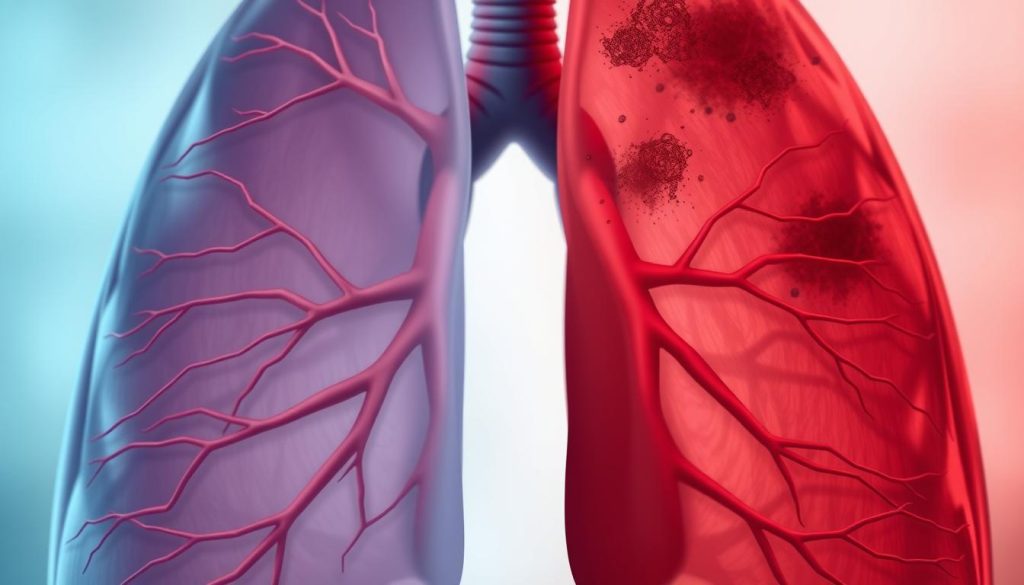
A cough that lasts for weeks or months might not be just a cold. It’s a symptom that needs attention, along with signs like shortness of breath or coughing up blood. These could mean cancer affecting the respiratory system.
Watch for these respiratory changes:
- Chronic cough that doesn’t improve
- Difficulty breathing or shortness of breath
- Wheezing or hoarseness
- Chest pain that worsens with deep breathing or coughing
While these symptoms don’t always mean cancer, they’re important to talk about with a doctor. Spotting cancer early can lead to better treatment and outcomes.
| Respiratory Symptom | Possible Indication | Action Required |
|---|---|---|
| Persistent cough (8+ weeks) | Lung cancer, throat cancer | Consult doctor for evaluation |
| Coughing up blood | Lung cancer | Seek immediate medical attention |
| Chronic shortness of breath | Lung cancer, mesothelioma | Schedule medical assessment |
Digestive System Disruptions
Changes in your digestive system can signal cancer. Spotting these changes early is key. Look out for ongoing shifts in your body’s functions.
Bowel Habit Changes
Watch your bowel movements closely. Diarrhea, constipation, or unusual stool shapes could mean trouble. If these issues last more than a few weeks, see a doctor.
Stomach Pain and Bloating
Stomach pain or feeling full all the time might be cancer signs. While some bloating is normal, persistent pain or swelling is not. These could signal problems in your stomach or other organs.
Difficulty Swallowing
Having trouble swallowing food or liquids is a red flag. This symptom, called dysphagia, can hint at throat or esophageal cancer. It might feel like food is stuck in your throat or chest. Don’t ignore these feelings – they could be cancer clues.
These digestive issues don’t always mean cancer, but they’re not to be ignored. If you have any of these symptoms for a long time, get medical help. Early detection can greatly improve treatment chances.
Lymph Node Changes and Swelling
Lymph node changes can be a key warning sign of cancer. The lymphatic system helps protect our body, and swelling could mean trouble. Knowing these signs can help find cancer early and improve treatment chances.

Swollen lymph nodes feel like small, firm lumps under the skin. They often appear in the neck, armpits, and groin. While not always serious, swelling that lasts more than two weeks needs a doctor’s check-up. This is true if the swelling is painless or comes with other symptoms.
Several cancers can cause lymph nodes to swell:
- Lymphoma
- Leukemia
- Breast cancer
- Lung cancer
- Skin cancer
But, swollen lymph nodes are more often due to infections than cancer. Yet, they are a common sign that should not be ignored. Paying attention to your body and knowing what’s normal can help you notice changes early.
| Cancer Type | Typical Lymph Node Location | Other Associated Symptoms |
|---|---|---|
| Lymphoma | Neck, armpit, groin | Fatigue, night sweats, weight loss |
| Breast Cancer | Armpit, collarbone area | Breast lump, skin changes |
| Lung Cancer | Chest, neck | Persistent cough, shortness of breath |
Early detection is critical. If you see persistent swelling or other unusual changes, see your doctor right away. Taking care of your health early can greatly improve cancer treatment outcomes.
Neurological Symptoms and Headaches
It can be hard to spot cancer signs in the nervous system. Some symptoms might point to cancer. Let’s look at these signs to know when they’re serious.
Vision and Hearing Changes
Changes in vision or hearing could be cancer signs. Blurred vision, double vision, or hearing loss might mean tumors in the brain or ears. If these changes don’t go away, see a doctor fast.
Balance and Coordination Issues
Having trouble with balance or coordination could mean a brain or nervous system problem. Look out for:
- Frequent stumbling or falling
- Trouble walking in a straight line
- Difficulty performing simple tasks
These signs need medical attention, if they keep happening or get worse.
Memory and Cognitive Changes
Cognitive changes can be small but important cancer signs. Watch for:
- Unexplained confusion or disorientation
- Difficulty concentrating or making decisions
- Personality changes or mood swings
| Symptom | Possible Indication | When to Seek Help |
|---|---|---|
| Vision Changes | Brain tumor, eye cancer | Persistent for 2+ weeks |
| Balance Issues | Brain or spinal cord tumor | Recurring or worsening |
| Memory Problems | Brain cancer, metastasis | Interfering with daily life |
These symptoms don’t always mean cancer. But catching cancer early can help a lot. If you’re worried about any changes, talk to a doctor.
Unusual Lumps and Masses
Spotting cancer early means noticing odd changes in your body. A key sign of cancer is finding unusual lumps or masses. Not all lumps are cancer, but noticing new growths is key for catching cancer early.
Lumps can pop up anywhere and differ in size, feel, and how they move. It’s smart to check:
- Breast tissue
- Testicles
- Neck and throat
- Underarms
- Abdomen
Watch for lumps that are hard, don’t hurt, or grow fast. These signs might mean something serious. But, some lumps are okay, like those from exercise or fat.
| Lump Characteristic | Potential Concern Level |
|---|---|
| Soft and mobile | Low |
| Hard and fixed | High |
| Painful | Moderate |
| Painless | High |
| Rapid growth | High |
If you find any odd lumps or masses, don’t worry. Just book a doctor’s visit. Catching cancer early can really help with treatment.
Changes in Urinary and Bladder Habits
Unusual changes in how you urinate can be a sign of cancer. These symptoms might not always mean cancer, but they need to be checked by a doctor. Knowing these signs can help find cancer early and improve treatment.
Frequency and Urgency Changes
Needing to urinate more often or urgently could mean bladder or prostate cancer. These changes might happen slowly, so notice your usual habits.
Pain During Urination
Pain while urinating is another warning sign. It can feel like burning or sharp pain. This could mean different types of urological cancers.
Blood in Urine
Seeing blood in your urine is a serious sign that needs quick medical help. It can mean bladder, kidney, or prostate cancer. Don’t ignore this sign, as finding it early can greatly help treatment.
These symptoms can also come from non-cancerous issues. If you notice any changes, see your doctor right away. Regular health checks and knowing your body’s normal functions help spot cancer signs early.
Gender-Specific Warning Signs
Cancer symptoms differ between men and women. It’s important to know the signs specific to each gender. For women, changes in breast tissue, like lumps or nipple discharge, could mean breast cancer. Also, abnormal vaginal bleeding or pelvic pain might signal gynecological cancers.
Men should watch for testicular lumps or swelling, which could be testicular cancer. Trouble urinating or changes in urine flow might indicate prostate issues. Both genders need to be aware of these signs. Early detection can greatly improve treatment chances.
Regular screenings for gender-specific cancers are key. Women should get mammograms and Pap smears. Men should have prostate exams. By knowing your body and recognizing gender-specific cancer signs, you help protect your health.
FAQ
Q: What are the most common early warning signs of cancer?
A: Common signs of cancer include unexplained weight loss and persistent fatigue. Also, look out for unusual bleeding or bruising, and changes in skin appearance. Persistent pain, respiratory changes, digestive disruptions, and unusual lumps or masses are also signs. But remember, these symptoms can also be from non-cancerous conditions. Always see a healthcare professional for a proper check-up.
Q: Why is early detection of cancer so important?
A: Early cancer detection is key because it improves treatment outcomes and survival rates. When caught early, cancer is often more treatable. Regular health screenings and addressing unusual symptoms are vital for early detection.
Q: How can I differentiate between normal fatigue and cancer-related fatigue?
A: Cancer-related fatigue is more severe and lasts longer than normal tiredness. It doesn’t get better with rest and affects daily activities. If you’re feeling extremely tired for weeks and it’s impacting your routine, see your doctor.
Q: What types of skin changes should I be concerned about?
A: Watch for changes in moles, new skin growths, sores that don’t heal, and changes in skin texture or color. Use the “ABCDE” rule for melanoma: look for Asymmetry, Border irregularity, Color changes, Diameter increases, and Evolution or changes over time. Any lasting or concerning skin changes need a dermatologist’s check.
Q: How often should I perform self-exams for unusual lumps or masses?
A: Do self-exams monthly. Get to know your body’s normal look and feel. This way, you can spot any changes easily. Pay special attention to the breast, testicle, and skin self-exams. If you find new or changing lumps, see your healthcare provider right away.
Q: What digestive symptoms might indicate cancer?
A: Digestive symptoms that could hint at cancer include persistent bowel changes, blood in stool, and ongoing abdominal pain or bloating. Also, look out for difficulty swallowing and unexplained weight loss. While these can have many causes, it’s wise to have them checked by a doctor, mainly if they don’t go away or get worse.
Q: Are headaches a sign of brain cancer?
A: Headaches by themselves are rarely a brain cancer sign. But, if you have persistent or severe headaches that are different from usual, and they come with other neurological symptoms like vision changes or balance problems, get checked. Brain cancer usually shows up with a mix of symptoms, not just headaches.
Q: What are some gender-specific cancer warning signs?
A: Women should watch for changes in breast appearance or feel, unexplained pelvic pain, or abnormal vaginal bleeding. Men should be aware of testicular lumps or changes, difficulty urinating, or blood in urine or semen. Both genders should know the general signs of cancer and get the right screenings.
Q: How can I reduce my risk of developing cancer?
A: You can lower your cancer risk by living a healthy lifestyle. Don’t smoke, limit alcohol, keep a healthy weight, and eat well. Stay active, protect your skin from the sun, and get vaccinated against infections like HPV. Regular health check-ups and screenings are also key for early detection.
Q: What should I do if I notice possible cancer symptoms?
A: If you notice any lasting or concerning symptoms, see your healthcare provider quickly. Many symptoms can be from non-cancerous conditions, but early check-ups are important. Keep a symptom journal to share with your doctor. Early detection can greatly improve your chances if it is cancer.












